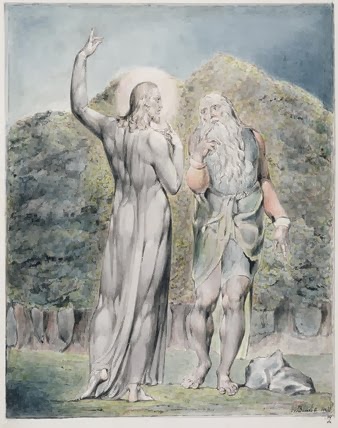Feb. Trinity I
(7th
Sunday before Easter, Sunday before Ash Wednesday)
Luke 18:18-27, 31-34
One of the highest spiritual leaders of the people asked him, "Good Master, what must I do to obtain eternal life?"
Jesus answered him, "Why do you call me good? No one is good but One—God alone. You know the commandments—you shall not destroy marriage, you shall not kill, you shall not steal, you shall not speak untruth, and you shall honor your father and your mother!"
He said, "All these I have observed strictly from my youth."
When Jesus heard
this, he said, 
Hoffman
"One thing however you lack: Sell all of your possessions and give the money to the poor;
thus will you achieve a treasure in the spiritual world—then come and follow
me!
He was sad about these words, for he was very rich. And when Jesus saw him thus, he said, "What hindrances must those overcome who are rich in outer or inner possessions, if they want to enter into the kingdom of God. Sooner would a camel walk through the eye of a needle than a rich man be able to find the entrance to the kingdom of God!"
Those who heard this said, "Who then can be saved?"
He said, "For humans
alone, it is impossible. It will be possible, however, through the power of God
working in them."
…
Then he took the twelve to himself and said, "Now we are going up to Jerusalem, and everything which the prophets have written about the Son of Man will fulfill itself: He will be given over to the peoples of the world; they will mock and taunt him, they will spit upon him and scourge him and kill him, but on the third day he will rise up from the dead."
Yet his disciples
understood nothing of all this. The meaning of his words remained hidden from
them, and they did not recognize what he was trying to tell them.
2nd February Trinity
February 14, 2021
Luke 18:18-27, 31-34
Here in the Northern Hemisphere, we are
looking forward to the richness of spring and summer's fullness; but below the equator, autumn and winter are approaching. This is a picture of a great truth on the soul level: Like the whole of the earth, over the whole of a lifetime, no matter what our riches, we must pass through loss and death to arrive at a new life.This is brought home to the rich young man in the gospel reading. He is rich, both inwardly and outwardly; he is in the summer of his development. But Christ is asking him to take the next step—a step into an autumn shedding, the step into a winter sleep. He is to become a Lazarus, one who leaves behind a topside wealth for the good of others and lays down his life.
At this moment in the gospel, the young man is very sadꟷhe already experiences the grief of loss. But in following Christ, he will be called forth to a whole new level of being. His loss and death will be real and complete. But so will be his completely new and unforeseen lifeꟷfor Christ will intimately and continuously accompany his further developmentꟷthrough loss and death, and into a further life.
Mary Oliver says:
Every year
everything
I have ever learned
in my lifetime
leads back to this: the fires
and the black river of loss
whose other side
is salvation
….
To live in this world
you must be able
to do three things:
to love what is mortal;
to hold it
against your bones knowing
your own life depends on it;
and, when the time comes to let it go,
to let it go.*
*Mary Oliver, "In Blackwater Woods."

























